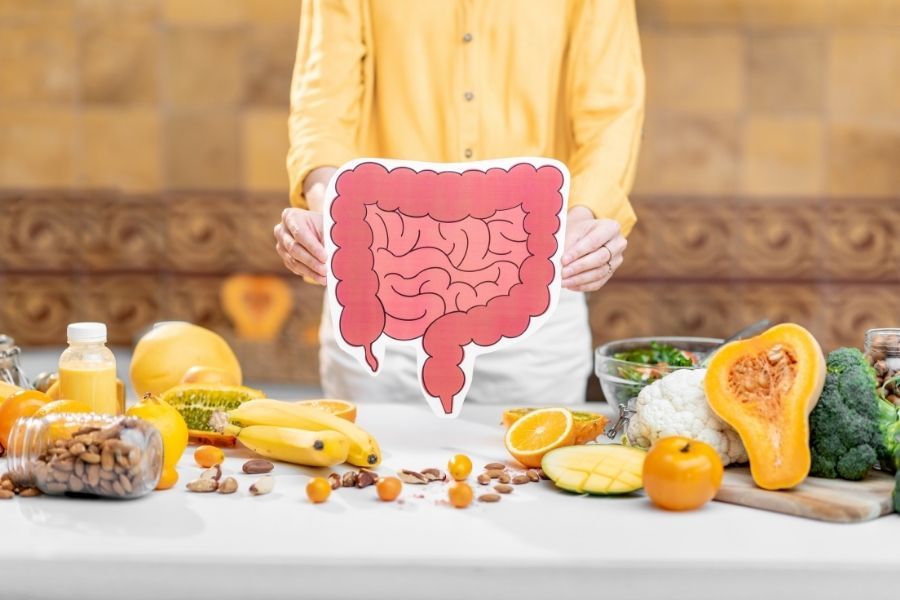
Signs of an unhealthy gut
The balance of "good" and "bad" bacteria can be affected by factors such as illnesses, diet change or lifestyle changes.
Here are possible signs of an unhealthy gut:
1. Upset stomach

- Having poor gut health affects your body's ability to process food well. Some signs of an upset stomach include:
- Bloating
- Constipation
- Diarrhoea
- Heartburn, which is a painful or burning feeling at the chest or throat area. It happens when the acid from stomach goes back up the throat.
2. Gaining or losing weight without changes to your diet or exercise habits

- An unhealthy gut may reduce the body’s ability to take in nutrients, control sugar levels in the blood and store fat.
- When the body is unable to take in nutrients well because "bad" bacteria builds up in the gut, weight loss can happen.
- On the other hand, an unhealthy gut can also affect the way insulin works in the body. Insulin is a hormone in our body that helps to control our blood sugar. Over time, this results in a state known as insulin resistance, where insulin stops working well, and this can cause weight gain.
3. Poor sleep or constant tiredness
 |
|
- Serotonin is a hormone that affects our mood and sleep. It is mainly produced in the gut.
- An unhealthy gut can cause a person to have poor quality of sleep due to changes in your serotonin levels.
- Having a poor quality of sleep may lead to constant tiredness in the long run.
4. Skin conditions
 |
|
- Certain skin conditions have been linked to poor gut health. Examples include:
- Psoriasis, a skin condition that causes scaly and itchy skin patches
- Eczema
- Acne
- Dandruff
5. Autoimmune conditions
 |
- Some studies have found that having an unhealthy gut may increase inflammation in the body.
- This may lead to the development of autoimmune conditions, where the body’s immune system mistakes the body as a foreign object and attacks the body by mistake instead.
Tips to improve your gut health
What you eat can affect the balance of bacteria in your gut.
- Reduce eating processed foods and foods high in sugar.
- Have a healthy, balanced diet that includes the following types of food to improve your gut health:
- Food with high amounts of fibre, such as:
- Fruits (examples: berries, bananas)
- Vegetables (examples: asparagus, leeks, broccoli, carrots)
- Legumes (examples: peas, beans)
- Whole grains
- Fermented food or drinks, such as:
- Plain natural yoghurt
- Kimchi
- Miso
- Tempeh
- Kombucha
- Food with high amounts of fibre, such as:
Here are some other tips for good gut health:
1. Avoid food that you have difficulty digesting
 |
|
2. Eat your meals slowly
 |
- Eating slower and chewing your food properly improves your digestion and the absorption of nutrients.
- This may also reduce indigestion and improve gut health.
3. Drink plenty of water
 |
|
- Studies have shown that having enough water throughout the day helps to maintain the lining of the intestines and the balance of good bacteria in your gut.
4. Manage your stress
 |
|
- Consider meditation, walking, getting a massage or spending time with family and friends to help manage your stress.
5. Get enough sleep
 |
|
- Get at least 7 to 8 hours of undisturbed sleep per night to maintain gut health.
6. Consider taking a prebiotic or probiotic supplement
 |
|
- Prebiotics promotes the growth of good bacteria in the gut while probiotics may contain either good bacteria or yeast.
- Please consult your healthcare providers before taking any supplements if you have any existing health conditions.
If you have any questions about your medicines or wish to get advice on your health condition, you may send us your question here. If you need advice immediately, please consult a Doctor or call our Pharmacist via our NHGP contact centre at 6355 3000.
.png)



















































